One of the most important French stage and film actors of his era was Pierre Fresnay (1897-1975). He abandoned a career with the Comédie-Française for the challenge of the cinema and appeared in more than sixty films. His best-known films include Marius (1931), Hitchcock's first version of The Man Who Knew Too Much (1934), and Renoir’s epic La grande illusion (1937). After WW I he returned as a hero, but after WW II he was detained in prison while allegations of collaboration were investigated.
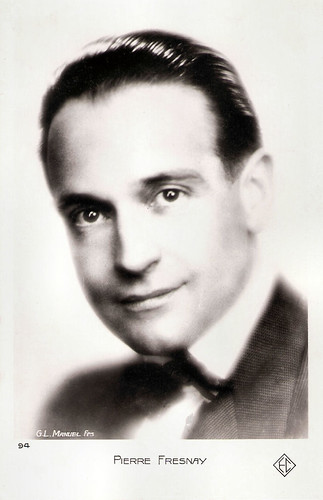
French postcard by EC, no. 94. Photo: G.L. Manuel Frères.
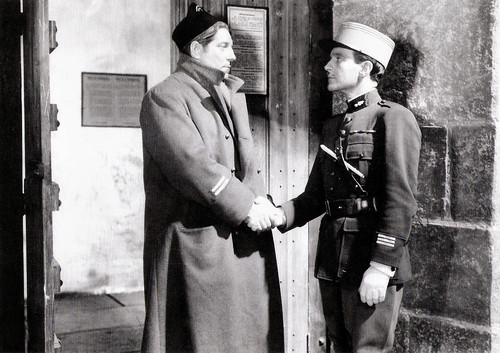
Italian programme card for Il Cinema Ritrovata 2012. Photo: publicity still for La grande illusion (Jean Renoir, 1937) with Jean Gabin and Pierre Fresnay.
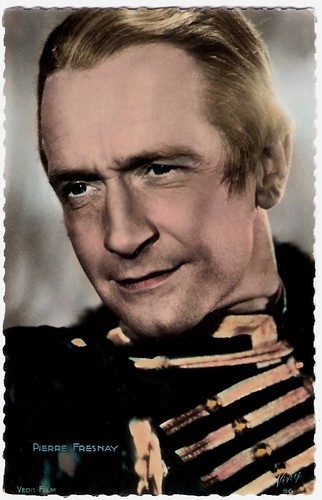
French postcard by Viny, no. 86. Photo: Vedis-Film. Publicity still for Les trois valses/Three Waltzes (Ludwig Berger, 1938).
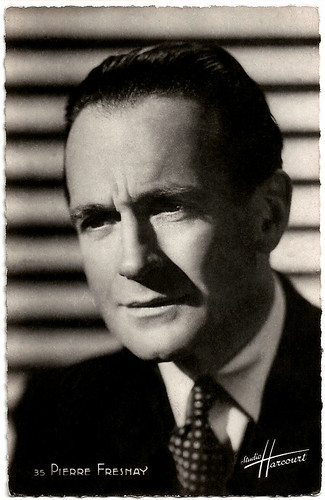
French postcard by SERP, Paris, no. 35. Photo: Studio Harcourt.
Pierre Fresnay was born Pierre Jules Louis Laudenbach in Paris, France in 1897. He was the son of Jean Henri Laudenbach, professor of philosophy, and Désirée Claire Dietz.
At 14, Pierre made his stage debut. His uncle, the actor Claude Garry encouraged him to pursue a career in theatre and film and arranged a small role for him in L’Aigrette by Dario Niccodemi at the Theatre Rejane. This was against the wishes of his parents who had hoped Pierre might pursue a university career. On this occasion, he chose his first stage name, Pierre Vernet.
In 1914, he entered the Conservatoire national de musique et de déclamation (National Conservatory of Music and Declamation in Paris), in a class with Paul Mounet and Georges Berr. Only 19, he was hired by the prestigious Comédie-Française as a Pensionnaire (contract player). He had his first major theater role in 'Le Jeu de l'amour et du hasard' (The Game of Love and Chance) in 1915.
That same year he made his silent film debut with a small role in the patriotic drama France d'abord/First France (Henri Pouctal, 1915) with André Luguet. World War I was raging, and in 1917 he enlisted as a soldier in the French Army. After the war, he returned to his career as a hero.
Throughout the 1920s, Fresnay appeared in many popular stage productions. He became a Sociétaire (life member) of the Comédie-Française four years before he resigned in 1927. During the next 10 years, he worked in England and the United States as well as in France. He was outstanding in the title roles in 'Cyrano de Bergerac' (1928) and 'Don Juan' (London, 1934). He had his greatest stage success in the title role of Marcel Pagnol’s 'Marius' (1929). The play ran for over 500 performances.
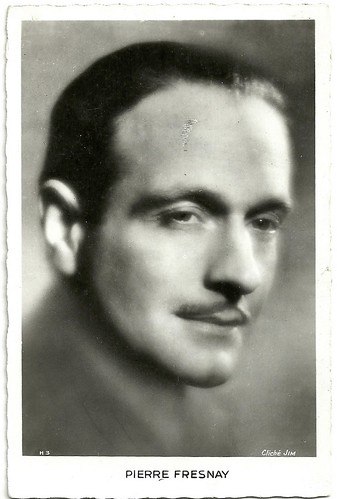
French postcard, no. H 3. Photo: Jim.

French postcard by Crépa, Editeur, Paris. Photo: Sam Lévin. Jean Gabin, Dalio, Carette, Gaston Modot and Pierre Fresnay in La grande illusion/The Grand Illusion (Jean Renoir, 1937).
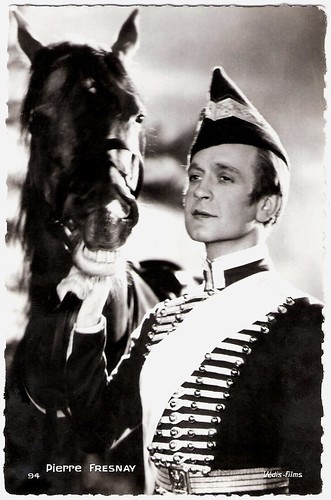
French postcard by Collection Chantal, Paris, no. 4. Photo: Védis Films. Publicity still for Les trois valses/Three Waltzes (Ludwig Berger, 1938).
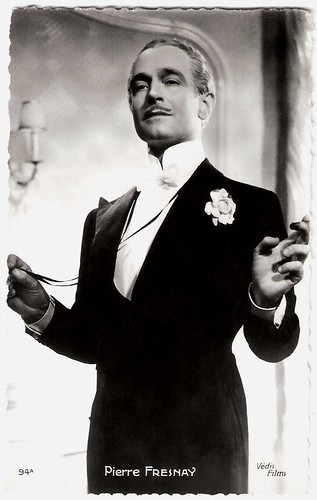
French postcard by Edit. Chantal, Rueil (S.O.), no. 94A. Photo: Védis Films. Publicity still for Les trois valses/Three Waltzes (Ludwig Berger, 1938).
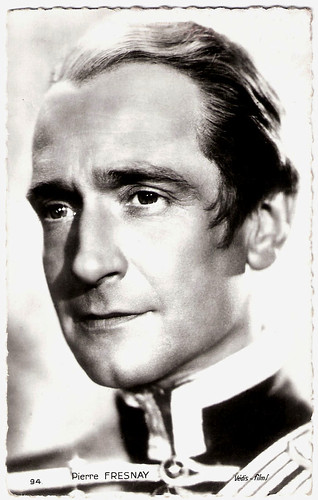
French postcard by Edit. Chantal, Rueil (S.O.), no. 94. Photo: Védis Films. Publicity still for Les trois valses/Three Waltzes (Ludwig Berger, 1938).
Pierre Fresnay’s first great screen role was also as Marius in the film adaptation of Pagnol’s play, Marius (Alexander Korda, 1931). At French Films, James Travers writes: "Marius offered an unembellished slice of life in the southern French port which came as a breath of fresh air to audiences of the time. What was so refreshing about the film was its total lack of artifice. The story it tells is a simple one which anyone who saw it could relate to. It deals with everyday themes - the rift between parents and their grown-up children, the pains and practicalities of falling in love, the difficulty of reconciling personal ambitions with the emotional need for love and stability."
The part established Fresnay’s reputation as a cinema actor and made him an instant matinee idol. He played Marius again in the next two parts of Marcel Pagnol's Marseilles Trilogy, Fanny (Marc Allégret, 1932) featuring Orane Demazis, and César (Marcel Pagnol, 1936) starring Raimu.
In 1934, he played Armand Duval in La Dame aux Camelias/Lady of the Camelias (Fernand Rivers, Abel Gance, 1934) at the side of Yvonne Printemps. The two married that same year. They appeared in eight films together, including the film operetta Les trois valses/Three Waltzes (Ludwig Berger, 1938).
Fresnay also appeared as the first-reel murder victim in Alfred Hitchcock's first version of The Man Who Knew Too Much (Alfred Hitchcock, 1934) with Leslie Banks and Peter Lorre.
A high point in his film career was his appearance as the young French officer opposite Erich von Stroheim in the anti-war epic La grande illusion/Grand Illusion (Jean Renoir, 1937). James Travers: “One of the undisputed masterpieces of cinema history, La grande illusion is a film of enduring popularity and one of the most powerful anti-war films of the Twentieth century. It stands beside Jean Renoir’s other triumph, La regle du jeu, as one of the all-time great French films.”
With the collaboration of an unknown scriptwriter, Henri-Georges Clouzot, Fresnay directed his one and only film Le duel/The Duel (Pierre Fresnay, 1939), starring Yvonne Printemps. According to James Travers, Le duel “was a mediocre effort which was soon forgotten with the outbreak of World War Two”.
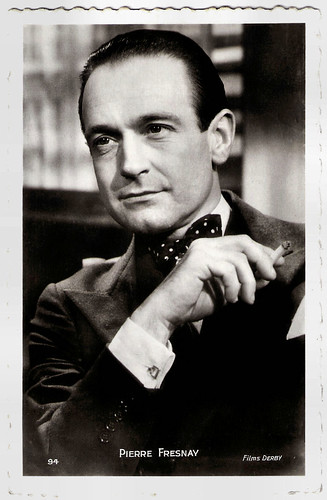
French postcard, no. 94. Photo: Films Derby. Publicity still for Le puritain/The Puritan (Jeff Musso, 1938).
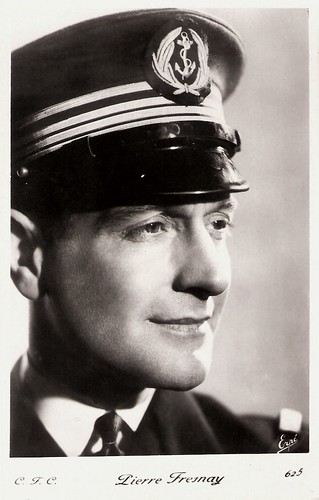
French postcard by Erpé, no. 625. Photo: C.F.C.
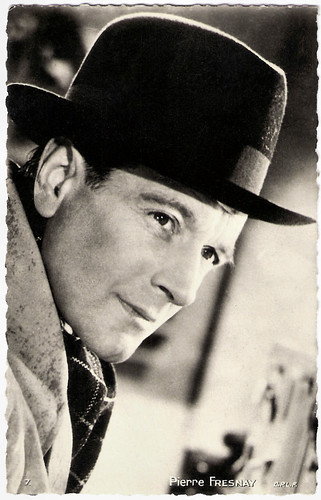
French postcard by Editions E.C., Paris, no. 7. Photo: C.P.L.F.
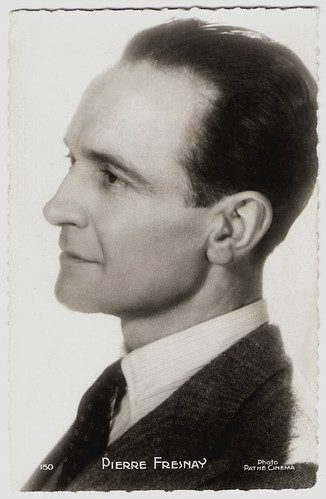
French postcard by Editions P.I., Paris, no. 150. Photo: Pathé Cinema.
Under the Nazi occupation of France, Pierre Fresnay worked for the Franco-German film company Continental, which was closely vetted by the Germans.
Fresnay appeared in several high-quality productions, including many films written or directed by his close friend Henri-Georges Clouzot. These included the comedy thriller Le dernier des six/The Last One of the Six (Georges Lacombe, 1941), where Fresnay played the part of the cool (but patient) Commissioner Wens.
He reprised the role for Clouzot’s directorial debut, L’assassin habite au 21/The Murderer Lives at Number 21 (Henri-Georges Clouzot, 1942) with the bubbling Suzy Delair as Wens’ girlfriend.
Fresnay later also starred in Clouzot’s most controversial film Le Corbeau/The Raven (Henri-Georges Clouzot, 1943), which created such an uproar that its director was temporarily banned from making films.
James Travers at French Films: "The film was banned after the war because of its perceived subversive and immoral overtones. The story was based on a real-life case which took place in the French town of Tulle in the 1920s. The film is an excellent suspense thriller, easily in the league of Clouzot’s subsequent films of this genre (Le salaire de la peur/The Wages of Fear (1953) and Les diaboliques/Diabolique (1954))."
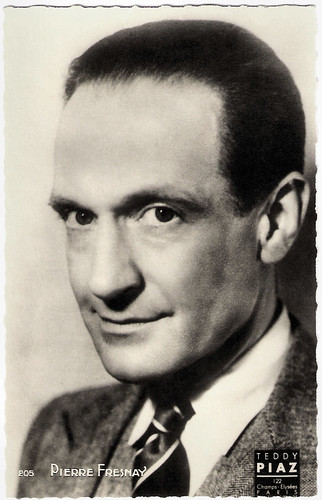
French postcard by Editions O.P., Paris, no. 205. Photo: Teddy Piaz, Paris.
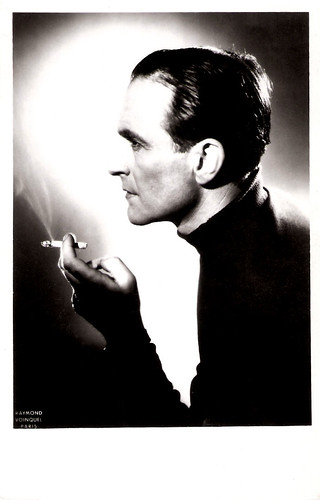
French postcard by A. Noyer, no. 1291. Photo: Raymond Voinquel, Paris.
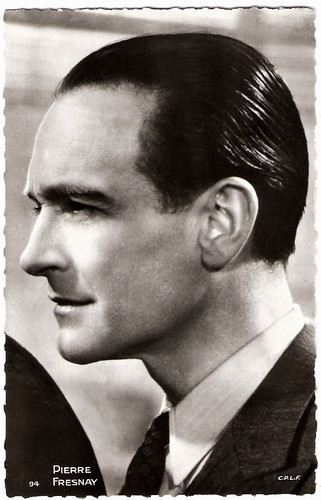
French postcard, no. 94. Photo: C.P.L.F.
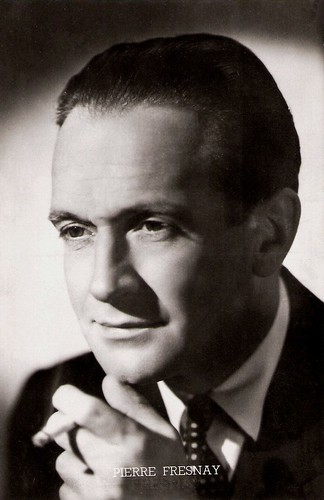
French postcard, no. 153.
After the war, Pierre Fresnay was detained in prison while allegations of collaboration were investigated. After being held for six weeks, he was released as a result of a lack of evidence. Despite Fresnay’s declarations that he worked in films to help save the French film industry in a period of crisis, the move damaged his popularity with the public. For the remainder of his film career, he would appear mainly in lesser roles in comparatively minor films.
There are some exceptions. In 1947 he played Vincent de Paul (namesake of the Vincent de Paul Society) in Monsieur Vincent (Maurice Cloche, 1947), for which he won the Volpi Cup for best actor at the Venice Film Festival. Monsieur Vincent was the first French-language film to win an Academy Award (in 1948).
Another success was Dieu a besoin des homes/God Needs Men (Jean Delannoy, 1950) with Madeleine Robinson, for which he was nominated for a BAFTA award, the British Oscar. Fresnay also portrayed Nobel Peace Prize laureate Albert Schweitzer in Il est minuit, Docteur Schweitzer/It Is Midnight Dr. Schweitzer (André Haguet, 1952).
In 1954, he published his memoirs, 'Je suis comédien' (I am an actor). His last film was the comedy Les vieux de la vieille/The Old Chaps (Gilles Grangier, 1960) with Jean Gabin. Throughout his career, he had maintained that he was a stage actor first and a film actor second. The cinema had clearly less appeal to him. Pierre Fresnay continued to perform regularly on stage through the 1960s and 1970s. In the early 1970s, he appeared in a few films for television. From then on, he co-directed with Yvonne Printemps the Théâtre de la Michodière in Paris until he died in 1975.
Pierre Fresnay died of respiratory problems at the age of 77 at Neuilly-sur-Seine and is interred there side by side with Printemps in the Neuilly-sur-Seine community cemetery. Before marrying Printemps he had married and divorced actresses Rachel Berendt (1917-1920) and Berthe Dovy (1923–1929). Asked how to say his name, he told The Literary Digest "I think my name is to be pronounced fray-nay. At least, it is the way I pronounce it."
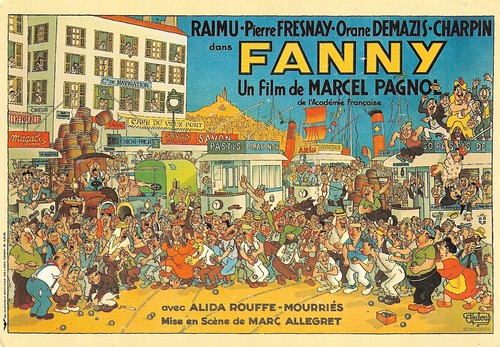
French postcard by CPM / Jean Dubout, 1982. Poster design by Albert Dubout (1950) for Fanny (Marc Allégret, 1932), based on the play by Marcel Pagnol.

French postcard by Jean Dubout, Paris, 2006, D 3. Poster design by Albert Dubout (1950) for a re-issue of César (Marcel Pagnol, 1936), written by Marcel Pagnol.
French trailer for the DVD Marseille Trilogy after the restoration in 2016. Source: Digital Ciné (YouTube).
Trailer for La grande illusion/Grand Illusion (1937). Source: Danios 12345 (YouTube).
Trailer for Le corbeau/The Raven (1943). Source: Dyran (YouTube).
French trailer for Monsieur Vincent (1947). Source: Lionsgate VOD (YouTube).
Sources: James Travers (French Films), Christian Grenier (L’encinémathèque - now defunct), Caroline Hanotte (CinéArtistes - French), Hal Erickson (AllMovie), Thomas Staedeli (Cyranos), AlloCiné (French), Encyclopedia Brittanica, Wikipedia (French and English), and IMDb.
This post was last updated on 12 April 2024.

French postcard by EC, no. 94. Photo: G.L. Manuel Frères.

Italian programme card for Il Cinema Ritrovata 2012. Photo: publicity still for La grande illusion (Jean Renoir, 1937) with Jean Gabin and Pierre Fresnay.

French postcard by Viny, no. 86. Photo: Vedis-Film. Publicity still for Les trois valses/Three Waltzes (Ludwig Berger, 1938).

French postcard by SERP, Paris, no. 35. Photo: Studio Harcourt.
Marius
Pierre Fresnay was born Pierre Jules Louis Laudenbach in Paris, France in 1897. He was the son of Jean Henri Laudenbach, professor of philosophy, and Désirée Claire Dietz.
At 14, Pierre made his stage debut. His uncle, the actor Claude Garry encouraged him to pursue a career in theatre and film and arranged a small role for him in L’Aigrette by Dario Niccodemi at the Theatre Rejane. This was against the wishes of his parents who had hoped Pierre might pursue a university career. On this occasion, he chose his first stage name, Pierre Vernet.
In 1914, he entered the Conservatoire national de musique et de déclamation (National Conservatory of Music and Declamation in Paris), in a class with Paul Mounet and Georges Berr. Only 19, he was hired by the prestigious Comédie-Française as a Pensionnaire (contract player). He had his first major theater role in 'Le Jeu de l'amour et du hasard' (The Game of Love and Chance) in 1915.
That same year he made his silent film debut with a small role in the patriotic drama France d'abord/First France (Henri Pouctal, 1915) with André Luguet. World War I was raging, and in 1917 he enlisted as a soldier in the French Army. After the war, he returned to his career as a hero.
Throughout the 1920s, Fresnay appeared in many popular stage productions. He became a Sociétaire (life member) of the Comédie-Française four years before he resigned in 1927. During the next 10 years, he worked in England and the United States as well as in France. He was outstanding in the title roles in 'Cyrano de Bergerac' (1928) and 'Don Juan' (London, 1934). He had his greatest stage success in the title role of Marcel Pagnol’s 'Marius' (1929). The play ran for over 500 performances.

French postcard, no. H 3. Photo: Jim.

French postcard by Crépa, Editeur, Paris. Photo: Sam Lévin. Jean Gabin, Dalio, Carette, Gaston Modot and Pierre Fresnay in La grande illusion/The Grand Illusion (Jean Renoir, 1937).

French postcard by Collection Chantal, Paris, no. 4. Photo: Védis Films. Publicity still for Les trois valses/Three Waltzes (Ludwig Berger, 1938).

French postcard by Edit. Chantal, Rueil (S.O.), no. 94A. Photo: Védis Films. Publicity still for Les trois valses/Three Waltzes (Ludwig Berger, 1938).

French postcard by Edit. Chantal, Rueil (S.O.), no. 94. Photo: Védis Films. Publicity still for Les trois valses/Three Waltzes (Ludwig Berger, 1938).
A breath of fresh air
Pierre Fresnay’s first great screen role was also as Marius in the film adaptation of Pagnol’s play, Marius (Alexander Korda, 1931). At French Films, James Travers writes: "Marius offered an unembellished slice of life in the southern French port which came as a breath of fresh air to audiences of the time. What was so refreshing about the film was its total lack of artifice. The story it tells is a simple one which anyone who saw it could relate to. It deals with everyday themes - the rift between parents and their grown-up children, the pains and practicalities of falling in love, the difficulty of reconciling personal ambitions with the emotional need for love and stability."
The part established Fresnay’s reputation as a cinema actor and made him an instant matinee idol. He played Marius again in the next two parts of Marcel Pagnol's Marseilles Trilogy, Fanny (Marc Allégret, 1932) featuring Orane Demazis, and César (Marcel Pagnol, 1936) starring Raimu.
In 1934, he played Armand Duval in La Dame aux Camelias/Lady of the Camelias (Fernand Rivers, Abel Gance, 1934) at the side of Yvonne Printemps. The two married that same year. They appeared in eight films together, including the film operetta Les trois valses/Three Waltzes (Ludwig Berger, 1938).
Fresnay also appeared as the first-reel murder victim in Alfred Hitchcock's first version of The Man Who Knew Too Much (Alfred Hitchcock, 1934) with Leslie Banks and Peter Lorre.
A high point in his film career was his appearance as the young French officer opposite Erich von Stroheim in the anti-war epic La grande illusion/Grand Illusion (Jean Renoir, 1937). James Travers: “One of the undisputed masterpieces of cinema history, La grande illusion is a film of enduring popularity and one of the most powerful anti-war films of the Twentieth century. It stands beside Jean Renoir’s other triumph, La regle du jeu, as one of the all-time great French films.”
With the collaboration of an unknown scriptwriter, Henri-Georges Clouzot, Fresnay directed his one and only film Le duel/The Duel (Pierre Fresnay, 1939), starring Yvonne Printemps. According to James Travers, Le duel “was a mediocre effort which was soon forgotten with the outbreak of World War Two”.

French postcard, no. 94. Photo: Films Derby. Publicity still for Le puritain/The Puritan (Jeff Musso, 1938).

French postcard by Erpé, no. 625. Photo: C.F.C.

French postcard by Editions E.C., Paris, no. 7. Photo: C.P.L.F.

French postcard by Editions P.I., Paris, no. 150. Photo: Pathé Cinema.
Subversive and immoral overtones
Under the Nazi occupation of France, Pierre Fresnay worked for the Franco-German film company Continental, which was closely vetted by the Germans.
Fresnay appeared in several high-quality productions, including many films written or directed by his close friend Henri-Georges Clouzot. These included the comedy thriller Le dernier des six/The Last One of the Six (Georges Lacombe, 1941), where Fresnay played the part of the cool (but patient) Commissioner Wens.
He reprised the role for Clouzot’s directorial debut, L’assassin habite au 21/The Murderer Lives at Number 21 (Henri-Georges Clouzot, 1942) with the bubbling Suzy Delair as Wens’ girlfriend.
Fresnay later also starred in Clouzot’s most controversial film Le Corbeau/The Raven (Henri-Georges Clouzot, 1943), which created such an uproar that its director was temporarily banned from making films.
James Travers at French Films: "The film was banned after the war because of its perceived subversive and immoral overtones. The story was based on a real-life case which took place in the French town of Tulle in the 1920s. The film is an excellent suspense thriller, easily in the league of Clouzot’s subsequent films of this genre (Le salaire de la peur/The Wages of Fear (1953) and Les diaboliques/Diabolique (1954))."

French postcard by Editions O.P., Paris, no. 205. Photo: Teddy Piaz, Paris.

French postcard by A. Noyer, no. 1291. Photo: Raymond Voinquel, Paris.

French postcard, no. 94. Photo: C.P.L.F.

French postcard, no. 153.
I am an actor
After the war, Pierre Fresnay was detained in prison while allegations of collaboration were investigated. After being held for six weeks, he was released as a result of a lack of evidence. Despite Fresnay’s declarations that he worked in films to help save the French film industry in a period of crisis, the move damaged his popularity with the public. For the remainder of his film career, he would appear mainly in lesser roles in comparatively minor films.
There are some exceptions. In 1947 he played Vincent de Paul (namesake of the Vincent de Paul Society) in Monsieur Vincent (Maurice Cloche, 1947), for which he won the Volpi Cup for best actor at the Venice Film Festival. Monsieur Vincent was the first French-language film to win an Academy Award (in 1948).
Another success was Dieu a besoin des homes/God Needs Men (Jean Delannoy, 1950) with Madeleine Robinson, for which he was nominated for a BAFTA award, the British Oscar. Fresnay also portrayed Nobel Peace Prize laureate Albert Schweitzer in Il est minuit, Docteur Schweitzer/It Is Midnight Dr. Schweitzer (André Haguet, 1952).
In 1954, he published his memoirs, 'Je suis comédien' (I am an actor). His last film was the comedy Les vieux de la vieille/The Old Chaps (Gilles Grangier, 1960) with Jean Gabin. Throughout his career, he had maintained that he was a stage actor first and a film actor second. The cinema had clearly less appeal to him. Pierre Fresnay continued to perform regularly on stage through the 1960s and 1970s. In the early 1970s, he appeared in a few films for television. From then on, he co-directed with Yvonne Printemps the Théâtre de la Michodière in Paris until he died in 1975.
Pierre Fresnay died of respiratory problems at the age of 77 at Neuilly-sur-Seine and is interred there side by side with Printemps in the Neuilly-sur-Seine community cemetery. Before marrying Printemps he had married and divorced actresses Rachel Berendt (1917-1920) and Berthe Dovy (1923–1929). Asked how to say his name, he told The Literary Digest "I think my name is to be pronounced fray-nay. At least, it is the way I pronounce it."

French postcard by CPM / Jean Dubout, 1982. Poster design by Albert Dubout (1950) for Fanny (Marc Allégret, 1932), based on the play by Marcel Pagnol.

French postcard by Jean Dubout, Paris, 2006, D 3. Poster design by Albert Dubout (1950) for a re-issue of César (Marcel Pagnol, 1936), written by Marcel Pagnol.
French trailer for the DVD Marseille Trilogy after the restoration in 2016. Source: Digital Ciné (YouTube).
Trailer for La grande illusion/Grand Illusion (1937). Source: Danios 12345 (YouTube).
Trailer for Le corbeau/The Raven (1943). Source: Dyran (YouTube).
French trailer for Monsieur Vincent (1947). Source: Lionsgate VOD (YouTube).
Sources: James Travers (French Films), Christian Grenier (L’encinémathèque - now defunct), Caroline Hanotte (CinéArtistes - French), Hal Erickson (AllMovie), Thomas Staedeli (Cyranos), AlloCiné (French), Encyclopedia Brittanica, Wikipedia (French and English), and IMDb.
This post was last updated on 12 April 2024.
7 comments:
The star cast of this picture is very amazing such that they keep on proving very good pictures. For these types of the pictures I was waiting from long time. All the images of the hero are superb.
I like mostly european film and film star... "The Titanic" movie I like most.
Pierre fresnay decided on acting career at an early age, against the wishes of his parents who had hoped he might pursue a university career.
Thanks for the comments, and the additional information. I really appreciate this. greetings from Amsterdam, Bob.
I like eropean movie.Eropean movie have more power on film and music industry.
A great stylist photo you have posted in your blog.I like all .
There is no political matter available in European movie. So i like it..
Post a Comment